Categories:Scraping Tools,Proxy
Top 5 Bright Data Alternatives to Use in 2026

Lead Software Engineer
Bright Data has the largest IP pool in the industry and delivers 98.44% success rates in testing.
It's perfect in every way but one: pricing.
Your scraping costs are unclear until you start scraping and when you do, you might meet with numbers you don't like.
If you're looking for alternatives that offer flexible pricing for both proxy infrastructure and web scraping APIs without forcing uniform rates across all domains, here are 5 options split between proxy providers and scraping APIs that deliver comparable or better performance at transparent price points.
What Bright Data Does Well
Before we cover alternatives, here's what makes Bright Data the industry standard.
Exceptional Performance and Largest IP Pool
Bright Data achieved 98.44% average success rate across seven challenging domains in independent testing, the highest among all providers tested.
The platform operates over 150 million IPs across 195 countries, spanning residential, datacenter, ISP, and mobile proxies.
This massive network delivered perfect 100% success rates on Indeed, Zillow, Capterra, and Google, with 98% on Amazon and 97% on Google Shopping.
The proxy pool includes ~770K datacenter IPs and 72+ million residential IPs with advanced targeting down to ZIP code, ASN, and city levels. Reddit users consistently praise the "massive IP pool" as the largest real-peer network for large-scale scraping operations, noting high success rates even on hard-to-scrape sites.
Automatic Parameter Selection and Web Unlocker
Bright Data's Web Scraper API automatically selects the optimal proxy type, browser fingerprint, and retry strategy based on the target domain.
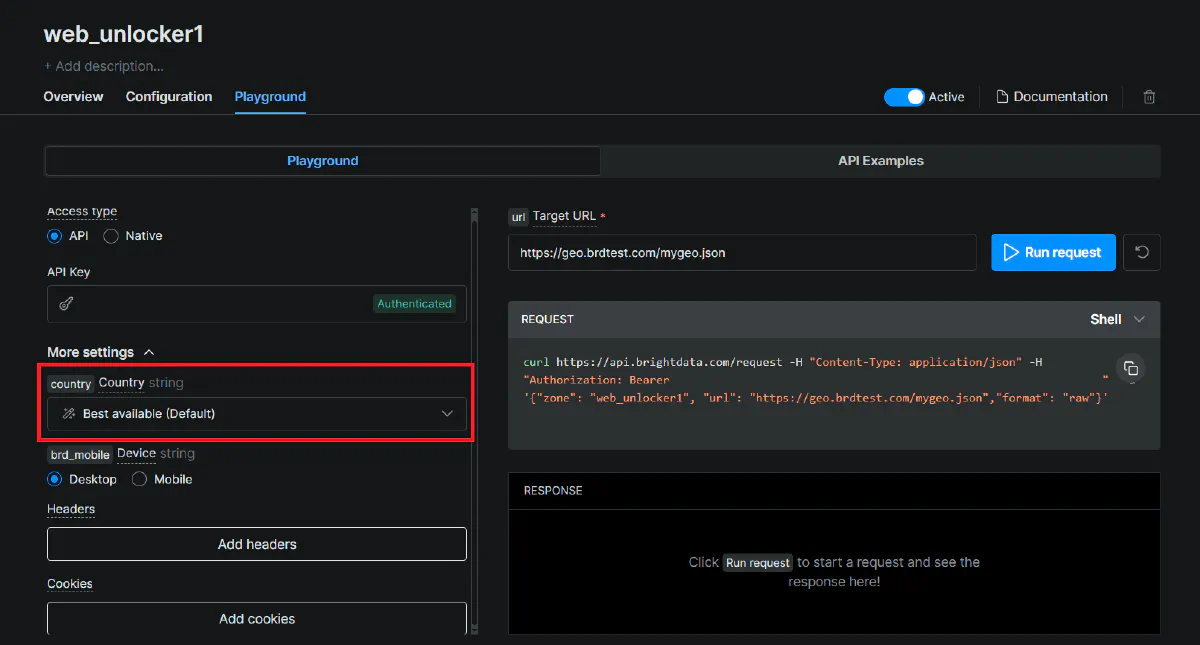
You don't need to experiment with parameter combinations or debug which settings work for each site; the API handles everything behind the scenes.
Web Unlocker adjusts to anti-bot measures automatically, removing the trial-and-error phase that plagues most scraping operations.
This automation means you send the URL and receive results without worrying about CAPTCHA solving, header rotation, or TLS fingerprinting. The system determines whether residential proxies, JavaScript rendering, or specific retry logic is needed for each request.
Ready-to-Use No-Code Data Collectors
Beyond the API, Bright Data offers ready-made no-code scrapers for 120+ popular websites including Amazon, LinkedIn, Walmart, and social media platforms.
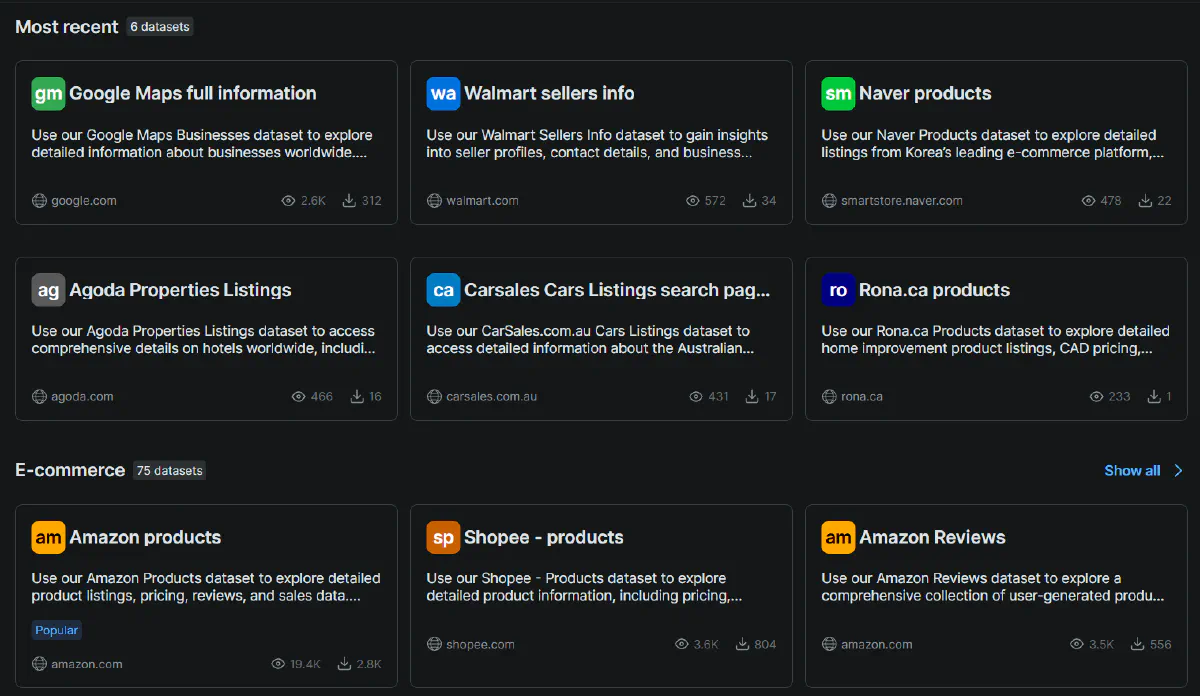
These data collectors scrape and parse content automatically, delivering structured datasets in JSON, HTML, or CSV with no custom code required.
Non-technical users can schedule tasks through the web interface and receive real-time insights without writing selectors or handling pagination logic.
The Web Scraper API also handles bulk operations up to 5,000 URLs at once, making it suitable for enterprise-scale data collection where speed and reliability matter more than per-request cost optimization.
Downsides of Bright Data
Despite the technical advantages, Bright Data's pricing model creates friction for cost-conscious users.
Pricing Creates Cost Unpredictability
Bright Data's pricing model penalizes you across both web scraping APIs and proxy products.
The Web Scraper API charges $1.50 per 1,000 requests for standard domains and $2.50 for premium targets regardless of actual page complexity.
A static HTML page that competitors scrape for $0.10-$0.20 per 1K costs the same $1.50 as a JavaScript-heavy protected site requiring rendering and premium proxies. This flat-rate structure eliminates any cost optimization when scraping lightweight targets.
The residential proxy product creates different problems with $10.50 per GB (pay-as-you-go) billing plus an additional $0.80/IP cost for datacenter IPs.
Unlike per-request pricing where 100K pages costs a fixed amount, pay-per-GB varies wildly based on page sizes. A site serving 500KB pages costs dramatically different than one delivering 3MB rendered files, and you won't know which until you're already paying.
Datacenter and Residential Proxy Alternatives for Bright Data
These three proxy providers deliver comparable network sizes and success rates to Bright Data's proxy infrastructure, with more flexible pricing structures and transparent costs that eliminate budget unpredictability.
| Provider | Datacenter Price (per IP) | Residential Price (per GB) | Proxy Pool Size | Avg. Success Rate | Avg. Response Time |
|---|---|---|---|---|---|
| Bright Data | $1.40/IP | $8/GB | 1.3M DC / 150M+ Res | ~98.96% | ~1.12s |
| Oxylabs | $1.2/IP | $8/GB | 175M+ Proxies | ~99.82% | ~0.41s |
| Decodo | $0.035/IP | ~$3/GB | 100K+ DC / 115M+ Res | ~99.86% | ~0.63s |
| IPRoyal | $1.57/IP (unlimited) | $7/GB | 32M+ Residential | ~98.22% | ~1.36s |
Pricing data is based on the cheapest starting plans, bigger packages will have more affordable per IP/GB numbers. Success and speed rates provided by proxyway.com
1. Oxylabs
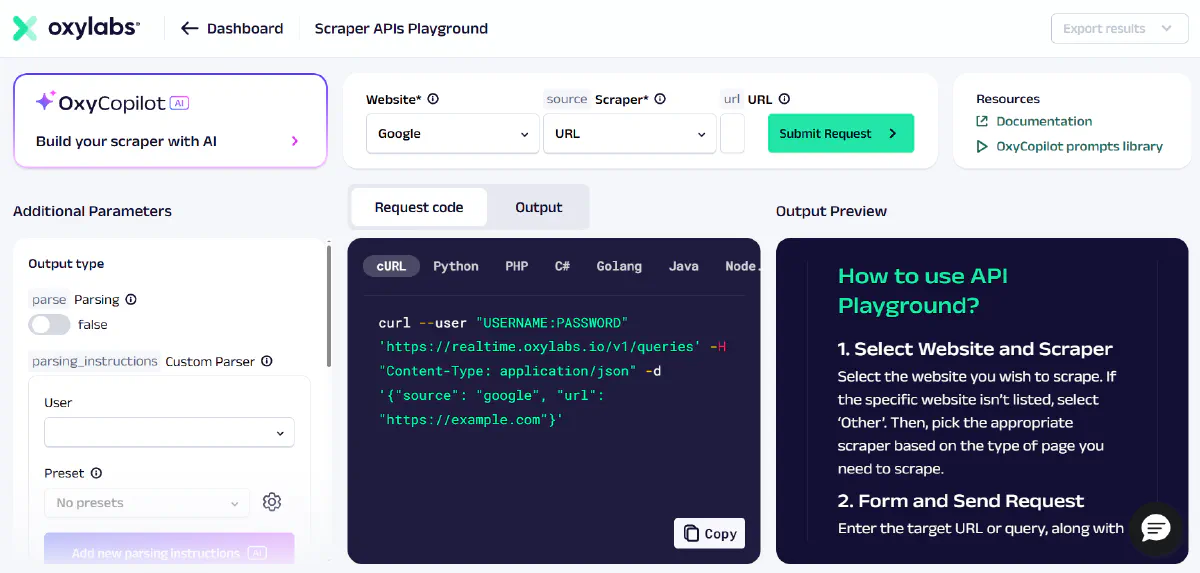
Oxylabs operates over 100 million IPs across 195 countries with residential, datacenter, ISP, and mobile proxy products, plus a Web Scraper API and Web Unblocker.
The proxy network achieved 99.95% average success rate with 0.6-second response times, outperforming Bright Data on both metrics. However, the $75 starting price and bandwidth-based billing ($9.40/GB for Web Unblocker, $10/GB for residential proxies) create similar unpredictability to Bright Data's model.
Oxylabs also offers web scraping APIs, but testing showed 92.52% success with 17.5-second average response times, significantly slower and less reliable than top tools. For scraping API use cases, Oxylabs is not the best alternative despite strong proxy performance.
Pros
- Extremely stable proxies with low ban rates: Reddit users report "extremely stable" proxies with very low ban rates even on tough sites like SNKRS. The huge IP pool of clean addresses delivers consistent success on heavily protected e-commerce platforms.
- Fastest proxy response times: Premium network infrastructure delivers average response times of 0.6 seconds, beating Bright Data's 1.02s and making it the fastest proxy provider tested.
- Highest success rate among proxy providers: At 99.95% average success, Oxylabs edges ahead of Bright Data's 99.17% on pure proxy reliability.
Cons
- Enterprise-oriented pricing requires sales contact: No simple pay-as-you-go option for small-scale users. Custom plans require contacting sales, adding friction before you can test the service.
- Not budget-friendly for small projects: Starting at $75/month for 8GB, it's more expensive than Bright Data's pay-as-you-go minimum and significantly higher than mid-tier alternatives.
- Complex pricing structure: Bandwidth-based billing makes cost forecasting difficult since page sizes vary dramatically between sites, creating the same unpredictability as Bright Data.
Bright Data vs Oxylabs
Oxylabs matches Bright Data's proxy network scale (100M+ IPs vs 150M+) and beats it on speed (0.6s vs 1.02s) and success rate (99.95% vs 99.17%), but both use pay-per-GB pricing that creates budget unpredictability. Oxylabs' $75 starting package is higher than Bright Data's accessible pay-as-you-go entry point.
Bright Data leads on product variety (120+ no-code scrapers, SERP APIs, datasets) while Oxylabs focuses purely on proxy infrastructure with the OxyCopilot AI assistant. For web scraping API use cases, Oxylabs' 92.52% success and 17.5s response times trail significantly behind dedicated scraping APIs. Both target enterprise customers; neither provides the pricing accessibility of budget-focused alternatives.
2. Decodo
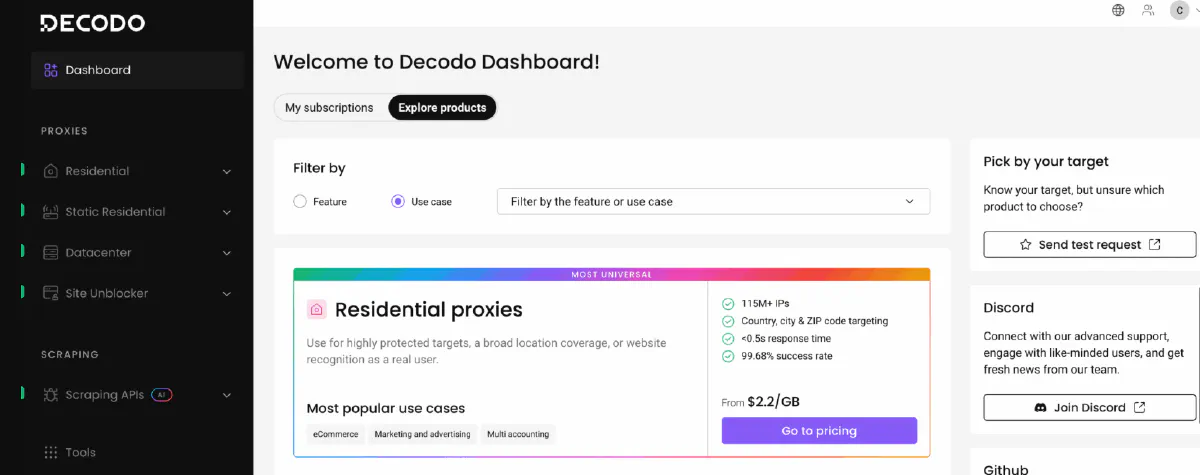
Decodo (formerly Smartproxy) provides 65+ million residential IPs and 500K+ datacenter proxies across global locations with sticky sessions and geo-targeting capabilities.
The service achieved 99.68% success rate with 0.54-second response times in testing, making it the fastest proxy provider measured. Pricing starts at $0.60/GB for shared datacenter proxies and ~$2.20/GB for residential plans, significantly lower than Bright Data's $10.50/GB residential rate while delivering comparable reliability.
Pros
- Very easy to use with intuitive dashboard: Setup takes minutes with intuitive controls. Reddit users highlight that the "dashboard setup takes minutes," making it accessible for non-technical users without extensive documentation.
- Flexible rotation options: Offers both rotating and sticky sessions to match different scraping needs. Sessions can persist for duration-based workflows or rotate per request, providing versatility that rigid providers lack.
- Good value pricing: At ~$2.20/GB for residential proxies, it costs 80% less than Bright Data's $10.50/GB while delivering comparable 99.68% success rates. This makes it significantly more accessible for mid-sized projects.
Cons
- Smaller IP pool than top-tier providers: 65M residential IPs vs Bright Data's 150M+ and Oxylabs' 100M+. Geographic coverage is broad but IP density per region is lower, which may impact large-scale operations requiring extreme diversity.
- APIs not included by default: Scraping API features cost extra beyond the base proxy plans, adding complexity to pricing. This contrasts with all-in-one solutions that bundle features.
- Minor throttling during peak demand: Reddit users report occasional slowdowns during "ultra high-demand events," though this affects a small percentage of use cases and most users don't encounter issues.
Bright Data vs Decodo
Decodo delivers the fastest response times tested (0.54s) and costs 80% less than Bright Data for residential proxies ($2.20/GB vs $10.50/GB), but operates a smaller IP pool (65M vs 150M+). Success rates are nearly identical at 99.68% vs 99.17%.
Bright Data's advantages: Network size, advanced features (Web Unlocker, 120+ no-code scrapers, SERP APIs, datasets), and deeper targeting options down to ZIP code level.
Decodo wins on: Simplicity, speed, and affordability for teams that don't need enterprise-scale infrastructure or auxiliary products. The $2.20/GB pricing makes Decodo significantly more accessible for mid-sized projects where budget matters more than having the absolute largest proxy pool.
3. IPRoyal
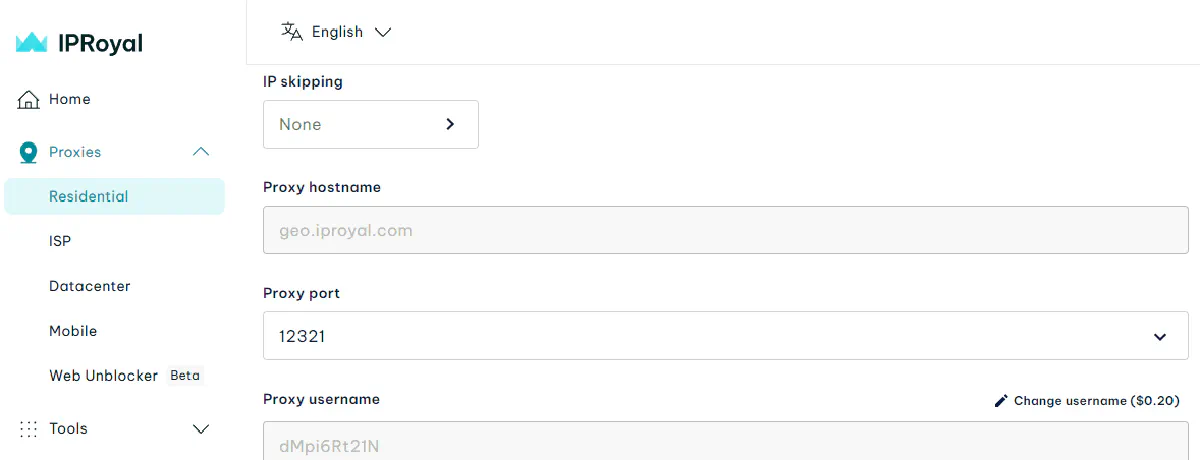
IPRoyal offers 32+ million residential IPs with datacenter proxies sold per IP starting at $1.39/IP monthly and residential proxies from $1.75/GB.
The platform achieved 98.2% success rate with 1.36-second response times in testing. IPRoyal's standout feature is unlimited bandwidth on datacenter proxies, eliminating per-GB fees that create unpredictability with Bright Data and other providers. Reddit users praise it as "super affordable" with solid performance on Shopify, Footsites, and even some SNKRS drops.
Pros
- Super affordable with unlimited bandwidth: Datacenter proxies cost ~$1/IP in bulk with no bandwidth limits. This flat per-IP pricing removes unpredictability entirely, making budgeting straightforward compared to pay-per-GB models.
- Solid performance on e-commerce platforms: Reddit users report consistent success on Shopify, Footsites, and even some SNKRS drops. The proxies handle moderate anti-bot protection reliably without breaking the budget.
- Unlimited data usage eliminates overage concerns: No per-GB fees on datacenter proxies means you can run high-volume scraping operations without worrying about bandwidth overages that spike costs unexpectedly.
Cons
- Smaller IP pool than enterprise providers: 32M residential IPs compared to Bright Data's 150M+ and Oxylabs' 100M+. Geographic diversity is limited in less common regions, which may impact projects requiring extreme location variety.
- Slower under heavy load: Performance can degrade during peak traffic periods. Users report occasional lag when multiple concurrent sessions run, though this is manageable for most use cases.
- Lower overall success rate: 98.2% is solid but trails the 99.17-99.95% range of top-tier providers. On heavily protected sites, the success gap becomes noticeable compared to premium alternatives.
Bright Data vs IPRoyal
IPRoyal's unlimited bandwidth datacenter proxies at $1/IP offer extreme affordability compared to Bright Data's $0.11/GB plus $0.80/IP model, but the 32M IP pool is a fraction of Bright Data's 150M+ network. Success rates differ notably: IPRoyal at 98.2% vs Bright Data at 99.17%.
Bright Data dominates on: Infrastructure scale, success rates, and feature depth (Web Unlocker, 120+ no-code scrapers, advanced targeting down to ZIP code, SERP APIs, datasets).
IPRoyal wins decisively on: Pricing simplicity and affordability for projects where unlimited bandwidth and budget constraints outweigh the need for maximum IP diversity or perfect success rates. The flat $1/IP pricing eliminates the unpredictability that plagues pay-per-GB models.
Web Scraping API Alternatives for Bright Data
These APIs handle proxies, rendering, and anti-bot measures automatically, eliminating the need to manage proxy infrastructure while delivering comparable or better performance than Bright Data's Web Scraper API.
| API Name | Avg. Success Rate | Avg. Response Time | Starting Price | Avg. Price per 1K Requests |
|---|---|---|---|---|
| Bright Data | 98.44% | 10.6s | Pay-as-you-go | $1.50 |
| Scrape.do | 98.19% | 4.7s | Freemium | $0.80 |
| Apify | N/A | N/A | $39 | $2.42 |
The table above compares Bright Data's Web Scraper API with two tested alternatives with two of the best web scraping APIs on the market.
4. Scrape.do
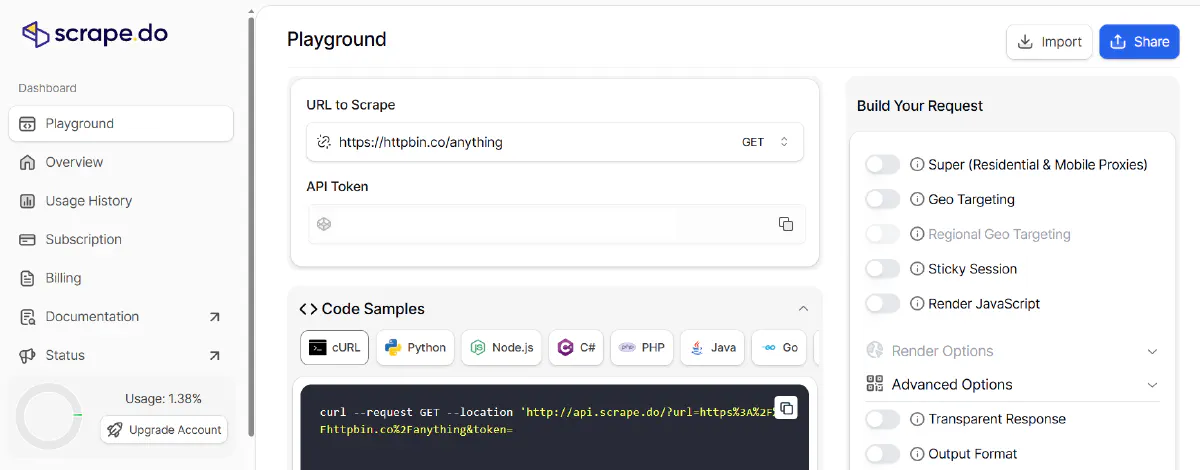
Scrape.do is a scraping API that delivered 98.19% success rates and 4.7-second average response times in testing, the fastest speed across all providers.
The platform operates 110+ million IPs across datacenter, residential, and mobile networks with transparent credit multipliers (5x for rendering, 10x for premium proxies, 25x for both). The freemium plan includes 1,000 requests monthly with no phone verification required, and the $29 starter package provides 250K requests with clear, consistent pricing across all domains.
Pros
- Fastest response times across all domains: Averaged 4.7s vs Bright Data's 10.6s. Amazon came back in 6.8s vs Bright Data's 9.3s, Google in 1.6s (Bright Data tested at 3.1s), and GitHub in 2.6s vs 3.7s. When speed determines throughput capacity, that 2.3x difference compounds significantly.
- Nearly identical success rate: Hit 98.19% average vs Bright Data's 98.44%, with perfect 100% on five out of seven domains compared to Bright Data's four. The reliability gap is negligible while the speed advantage is substantial.
- Transparent pricing without domain penalties: Parameters are disabled by default. You opt in explicitly, and credit multipliers apply consistently. No surprise static pricing on simple pages. Difficult domains cost $0.58-$2.90 per 1K vs Bright Data's flat $1.50-$2.50.
- Better value on both ends: Simple targets cost $0.12 per 1K (12x cheaper than Bright Data's $1.50), while protected sites with full parameters still come in at $2.90 vs Bright Data's $2.50 premium rate. Average cost of $0.80 per 1K is nearly half of Bright Data's $1.50.
Cons
- No official SDKs: While community SDKs exist, there are no officially maintained libraries for popular languages. Teams requiring enterprise SDK support need custom wrappers.
- Limited ready-to-use scrapers: Bright Data offers 120+ ready-made no-code scrapers; Scrape.do provides domain-specific examples and working code for popular sites but not the same breadth of pre-built solutions for non-technical users.
Bright Data vs Scrape.do
Scrape.do is 2.3x faster on average (4.7s vs 10.6s) and costs nearly half as much ($0.80 vs $1.50 per 1K), with opt-in parameters versus Bright Data's forced static pricing. Success rates are virtually identical at 98.19% vs 98.44%.
Bright Data leads on: IP pool size (150M+ vs 110M+), no-code scrapers (120+ vs limited examples).
Scrape.do wins decisively on: Speed, cost, pricing transparency, and freemium accessibility. For teams prioritizing performance and budget predictability over auxiliary products, Scrape.do delivers superior value with near-identical reliability.
Check in-depth comparison of Scrape.do vs Bright Data or start free with Scrape.do and see the difference for yourself.
5. Apify
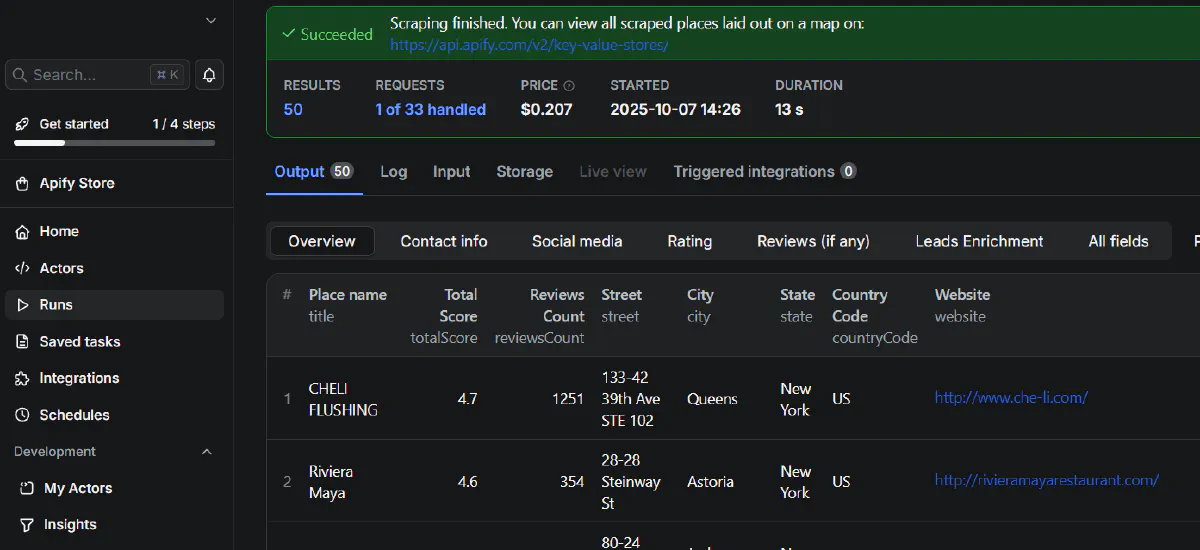
Apify is a web scraping and automation platform with a marketplace of 1,500+ ready-made actors (pre-built scrapers) for popular websites including Amazon, Google, LinkedIn, Instagram, and TikTok.
The platform operates on a serverless infrastructure where actors run on-demand with automatic scaling. Pricing starts at $39/month with an estimated $2.42 per 1K requests depending on actor complexity and compute usage. Unlike other APIs, Apify focuses on providing a marketplace where community developers create and maintain scrapers rather than offering a unified API endpoint.
Pros
- Massive marketplace of ready-made scrapers: Over 1,500+ actors cover virtually every popular website. If a site has significant scraping demand, there's likely a pre-built actor that handles pagination, parsing, and data structuring automatically.
- Community-driven innovation: Developers publish new actors constantly, often beating official providers to support newly emerging platforms or site structure changes. The marketplace model incentivizes rapid updates.
- Flexible pricing based on usage: Pay only for compute time used by actors. Simple scrapers cost less than complex ones, unlike flat-rate models that charge uniformly regardless of actual resource consumption.
Cons
- Inconsistent quality across actors: Community-maintained actors vary widely in reliability, documentation quality, and update frequency. Popular actors work well, but niche ones may be abandoned or poorly maintained.
- No unified API interface: Each actor has its own input schema and output format. You need to learn individual actor configurations rather than using a consistent API across all targets.
- Pricing complexity: Compute-based billing makes cost forecasting difficult since actor resource usage varies unpredictably. A simple scrape might spike costs if the actor is inefficiently coded.
Bright Data vs Apify
Both Bright Data and Apify offer extensive ready-to-use scraping solutions, but with fundamentally different approaches:
Bright Data's 120+ no-code scrapers are officially maintained by Bright Data's engineering team, ensuring consistent quality, security audits, and reliable updates when target sites change. This official support means enterprise teams can trust the infrastructure without worrying about abandoned or malicious code.
Apify's 1,500+ actors are community-created through a marketplace where developers build scrapers and earn revenue from usage. This creates dramatically more coverage (1,500 vs 120) but removes official support guarantees. Actors can be abandoned, outdated, or contain security vulnerabilities since they're not centrally maintained.
Choose Bright Data if you need enterprise-grade reliability, official support, and consistent performance across a smaller set of high-priority targets.
Choose Apify if you need broader site coverage, accept variable quality, and can evaluate individual actors before trusting them in production. The marketplace model provides more options but requires more due diligence.
What to Pick?
- For fastest proxy response times with enterprise stability: Oxylabs delivers 99.95% success at 0.6s response times with a 100M+ IP pool, though the $75 entry price and pay-per-GB billing create budget unpredictability.
- For affordable residential proxies with excellent speed: Decodo costs 80% less than Bright Data for residential proxies ($2.20/GB vs $10.50/GB) while delivering the fastest response times (0.54s) and comparable 99.68% success rates.
- For unlimited bandwidth without overage fees: IPRoyal's $1/IP flat pricing with no bandwidth limits removes cost unpredictability entirely, though the 32M IP pool and 98.2% success rate trail top-tier providers.
- For massive scraper marketplace coverage: Apify's 1,500+ community-built actors cover virtually every popular website, but quality varies and there's no unified API interface or official support.
- For fastest web scraping API without sacrificing reliability: Scrape.do delivers 98.19% success at 4.7s average response time (2.3x faster than Bright Data) with transparent opt-in parameters and nearly half the cost ($0.80 vs $1.50 per 1K).
Scrape.do combines near-perfect success rates (98.19%), the fastest response times (4.7s), and the most affordable per-request cost ($0.80), all with transparent pricing and a generous free tier to test before committing.

Lead Software Engineer












